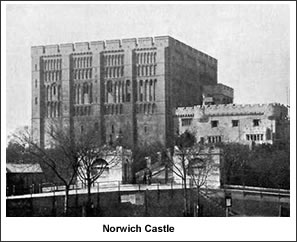When you do a one name study, it can get difficult trying to remember who everyone is.
I have a surfeit of Edmund Skillings in my tree, so they become known as Edmund the farmer, Edmund the stationmaster, Edmund the policeman … and Edmund the convict, Edmund the policeman’s son.
Edmund Skillings the policeman was illegitimate. When it was discovered that his mother was pregnant, she was whisked away from the parish of Little Massingham, where she was working and back to Edgefield, another parish in rural Norfolk, where she and her ancestors were settled. That was in 1814. By 1825, she was in Hales, getting married. On the 1841 census Edmund is living with her.
In rapid succession, he married, became a police constable and started a family. There was clearly a chance that this branch of the Skillings family might break free of the rural poverty that so dominated all the others that remained in Norfolk.
At this distance in time it is impossible to say where things started to go wrong for the family. Was it the constant moves from village to village that was a policeman’s lot, so the children never had the opportunity to keep friends outside the family? Was it the spate of infant deaths, followed by that of their mother in 1860 that started to unsettle the children?
In 1862, as a lad of 14, Edmund junior volunteered for continuous service in the Royal Navy. Nothing came of it. By 1871 he was a blacksmith at home with his father, his sister Hannah, and her illegitimate son. By 1881 he was in Norwich Castle prison.
I imagined burglary or violence had put him behind bars but the truth was more mundane. Drunkenness, vagrancy, “living in the open air” led to his being locked up for a few days at a time, usually with hard labour. His prison spells were so short that it was pure “luck” that he was in gaol on census night.
His crimes were so regular that I confess I didn’t look for his first offence or his last. He seemed unable to stay out of trouble for more than a couple of months and must have been the despair of the authorities.
His father had remarried a couple of years earlier and that had clearly marked the end of a family home for the children, who were scattered to the winds. Louisa was already a servant in Dukinfield, Lancashire by 1871. She came back to South Lynn, where she was lodging in 1881, and then she disappears. Family Tree Forum’s Darksecretz has almost certainly found her death in Lambeth in 1887. Josiah travelled to Barton on Irwell, where he was working as a railway navvy in 1881. In 1901 he was still in Lancashire, unmarried, where he seems to have died in 1903. Hannah was the only one of the surviving children known to marry and raise a family. Edmund the policeman rated an obituary when he died; Edmund the convict was in the workhouse in 1901.
The nominal registers of prisoners for Norwich Prison give:
register number
name of prisoner
date and place of committal
date and place of trial and of conviction
offence
sentence
education
age, height and colour of hair
trade or occupation
religion and birth place
number of previous convictions and reference to last entry (though sometimes they lose count!)
date of discharge
remarks
You can find out so much about a convict ancestor. Some of them are hard boiled criminals, but Edmund Skillings the convict seems to have been someone who simply slipped through the net of society. I feel that he would have fared no better in 21st century society than he did in Norwich Prison in 1881.
Phoenix
© Phoenix 2008
Image of Norwich Castle: The Project Gutenberg eBook of The Cathedral Church of NORWICH by C.H.B. Quennell
